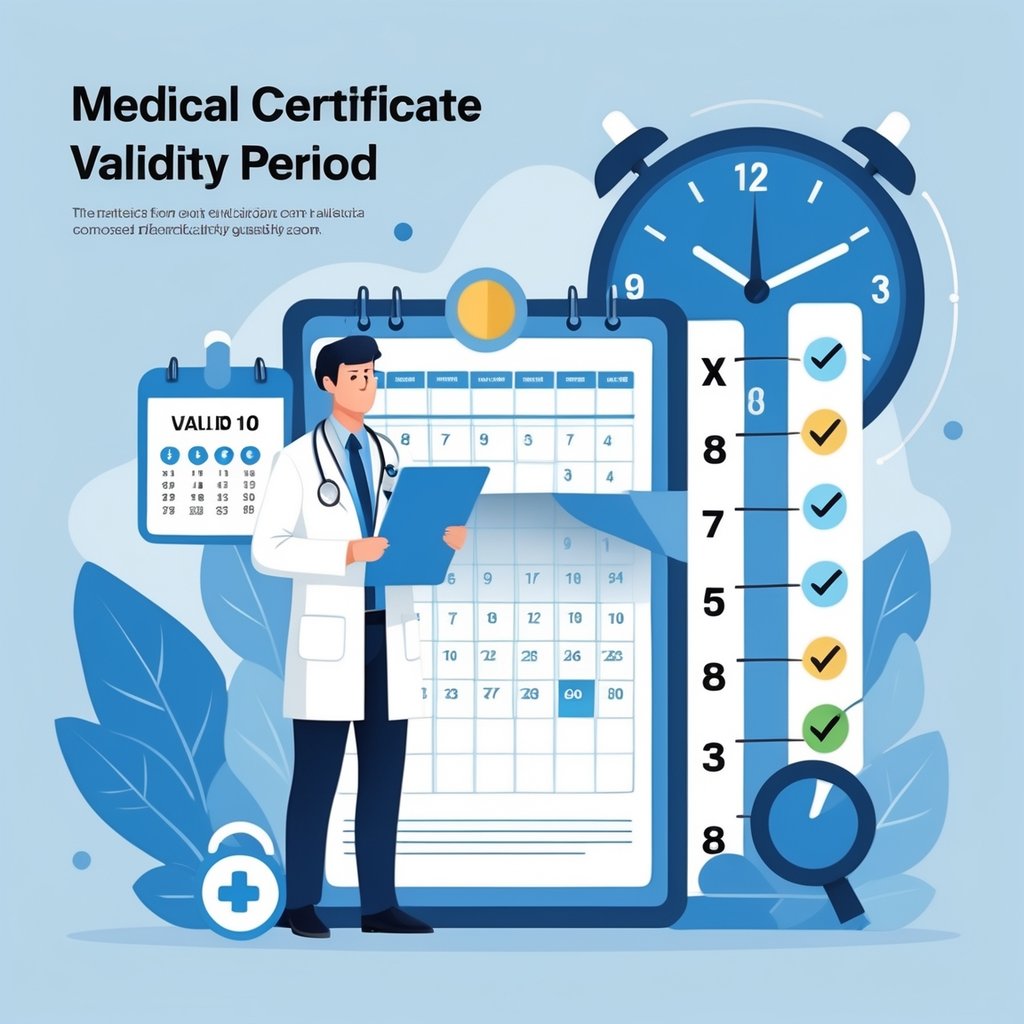When you start the immigration process, a big question pops up: how long does your medical exam stay valid? Most immigration medical exams last for two years from the date a civil surgeon signs your Form I-693, but this depends on when you did your exam and which country you’re applying to.

The validity period of your medical exam can make or break your immigration timeline. If your exam expires before you submit your application, you’ll have to start over.
That means more time, extra money, and possible delays in your case. Keeping track of these timeframes helps you plan better and avoid headaches.
Rules aren’t the same everywhere. Even in the same country, policies can shift. For instance, USCIS recently updated their guidance on Form I-693 validity for exams done after November 1, 2023.
Key Takeaways
- Medical exam validity periods usually range from 12 months to 2 years, depending on the country and requirements
- USCIS medical exams signed after November 2023 have no expiration under new policy changes
- Good timing helps you avoid delays and repeating the exam
Understanding Medical Exam Validity Periods

Medical exam validity periods set how long your immigration medical exam stays acceptable for USCIS. These rules have shifted a lot, and new ones affect when you need a fresh exam.
Definition of Medical Exam Validity
Medical exam validity is the period your Form I-693 remains legally acceptable for immigration. The clock starts when a civil surgeon signs your completed form.
Your medical exam validity is a guarantee that your health screening meets current immigration standards. USCIS uses this window to keep medical information up to date.
The validity period depends on when your exam was completed. Different rules kick in based on your exam date.
Common Validity Timeframes for Immigration
Current validity timeframes depend on when your civil surgeon finished your exam.
Medical exams done on or after November 1, 2023:
- Valid indefinitely
- No expiration
- Usable for any future immigration application
Medical exams finished before November 1, 2023:
- Valid for 2 years from the signature date
- Needs renewal after expiration
- Exception: Operation Allies Welcome parolees get 3 years
USCIS announced these changes to cut paperwork for applicants. The new policy means most people won’t have to repeat exams.
USCIS officers might still ask for an updated medical exam if they think your health changed.
Purpose of Validity Guidelines
Validity guidelines protect public health and keep information current. These rules help USCIS decide if you pose health risks to the United States.
The validity period system tries to balance efficiency with health security. In the past, older exams used paper, which made tracking a mess.
Now, electronic reporting to the CDC allows indefinite validity for recent exams. This gives real-time monitoring.
These guidelines keep you from using outdated info. They also help cut costs for most applicants.
USCIS Rules for Medical Exam Validity

USCIS changed its rules in June 2025 to limit how long medical exams stay valid. The new medical exam rule effective June 11, 2025 ties Form I-693 validity to active applications only.
Current Guidelines by U.S. Citizenship and Immigration Services
U.S. Citizenship and Immigration Services now says your Form I-693 is valid only while your green card application is active. The exam isn’t good forever anymore.
If your civil surgeon signed your Form I-693 on or after November 1, 2023, the form stays valid as long as USCIS is working on your case. USCIS revised validity rules for medical exam reports to keep medical info current.
Key Requirements:
- Form I-693 should go in with your Form I-485
- You need the July 3, 2025 edition
- The exam is valid only during active processing
If your application gets denied or you withdraw, your medical exam becomes invalid immediately. You can’t reuse the same Form I-693 for another application.
Changes to the 60-Day Rule
USCIS still wants you to submit your Form I-693 within 60 days of the civil surgeon’s signature. This rule stuck around.
The 60-day rule and the new validity requirements work together. You need to get your exam close to when you file. That way, your exam won’t expire before they look at your case.
Timeline Requirements:
- Civil surgeon signs Form I-693
- You get 60 days to submit to USCIS
- Form is valid only while your application is pending
Timing your exam well is crucial now. Don’t get it done months early and try to save it for later.
Validity for Exams After November 1, 2023
Medical exams signed on or after November 1, 2023 follow different rules than older exams. These newer exams are valid only for the specific application you send them with.
USCIS changes to I-693 medical exam validity mean you can’t reuse these forms. If your application fails, you’ll need a fresh medical exam for any future attempts.
This shift reversed an earlier policy from April 2024. USCIS had said these exams would be valid forever, but then changed course.
The agency decided that was too broad and could risk public health.
Exceptions and Special Cases
Medical exams signed before November 1, 2023 still follow the old two-year rule. These older forms stay good for two years from the signature date.
USCIS might ask for a new medical exam if they have health concerns. This could happen even if your current Form I-693 is technically still valid.
Special Situations:
- Exams before November 1, 2023: Valid for 2 years
- Health concerns: USCIS may ask for a new exam
- Multiple applications: Each needs its own medical exam
Some people might not need a medical exam at all. Still, USCIS can ask for one if they think there’s a public health issue. The validity of immigration medical examinations depends on your case and timing.
Key Forms and Documentation

Form I-693 is the official medical examination report for green card applications. A civil surgeon needs to complete and sign it to show you meet health requirements for permanent residence.
Role of Form I-693 in Adjusting Status
Form I-693 is mandatory for your adjustment of status application. You can’t finish the green card process without it.
Key requirements for Form I-693:
- Must be completed by a USCIS-designated civil surgeon
- Includes vaccination records and medical history
- Covers screening for communicable diseases
- Documents any needed medical treatments
The form stays valid for two years from the civil surgeon’s signature date. You need to submit it before that deadline.
Your application will hit delays or get denied if you don’t have a properly completed I-693. The form shows you don’t have health conditions that would make you inadmissible.
USCIS checks this form as part of your eligibility. Make sure every section is filled out and accurate.
Importance of Civil Surgeon Signature
Only USCIS-designated civil surgeons can sign Form I-693. Regular doctors can’t do it.
The civil surgeon’s signature validates your exam results. Without it, your form has zero legal value for immigration.
What the signature means:
- You finished all the required tests
- Vaccinations are up to date or properly waived
- No inadmissible health issues exist
- The exam followed USCIS guidelines
The signature date sets your form’s validity period. You get exactly two years from that date to submit your application.
Pick your civil surgeon carefully. Their reputation and thoroughness can impact your application’s success.
Medical Exam Components and Their Role in Validity

The immigration medical exam includes specific components that civil surgeons must complete for your Form I-693 to be valid. Each part of the exam helps decide if you’re admissible to the United States.
Physical Examination Details
Your physical exam covers several body systems and health markers. The civil surgeon checks your appearance, mental status, and vital signs.
Key physical exam components:
- Vision and hearing tests
- Heart and lung exam
- Abdominal check
- Lymph node assessment
- Extremities and joint evaluation
The civil surgeon notes any abnormal findings on your Form I-693. Missing or incomplete sections can mess with your form’s validity.
Your exam needs to follow USCIS technical instructions. Civil surgeons use standard procedures for consistency.
Lab tests are often required as part of your assessment. These might include blood tests for certain conditions, depending on your age and health history.
Medical History Review Process
Your medical history review is a deep dive into your past and present health. The civil surgeon asks about old illnesses, surgeries, medications, and hospital stays.
Mental health history gets special attention, including:
- Previous psychiatric treatment
- Substance abuse history
- Behavioral conditions
- Current mental health meds
You have to give accurate info about your background. If you leave something out or fudge the truth, your exam results could get tossed.
The civil surgeon might ask for records from your old doctors. These help verify your health and make sure the paperwork is solid.
Vaccination records get checked too. If you’re missing shots, you might need to get them before the civil surgeon can finish and sign your exam.
Timing Your Immigration Medical Exam

Good timing keeps your medical exam from expiring before your green card application is approved. Recent policy changes now tie exam validity to active applications only.
When to Schedule the Exam
Schedule your immigration medical exam close to when you plan to file your Form I-485 application. This timing helps keep your exam valid through the process.
Avoid scheduling too early. If you finish the exam months before filing, you risk it expiring from processing delays.
The Form I-693 is valid for two years from the civil surgeon’s signature date. New rules effective June 11, 2025, change how validity works.
Current validity rules:
- Exam stays valid while your application is pending
- Exam becomes invalid if your application is denied or withdrawn
- You need a new exam for any reapplication
Aim to complete your medical exam within 1 or 2 months of filing your green card application. This window gives you time to gather results but keeps the exam current.
Managing Processing Times
Immigration services processing times vary a lot depending on location and case type. Processing times range from 8 months to over 2 years for different field offices.
Check your local processing times on the USCIS website before you schedule anything. This helps you estimate your case timeline.
Consider these timing factors:
- Civil surgeon availability — some appointments take weeks to book
- Lab results — blood work and other tests need processing time
- Form completion — the surgeon needs time to finish I-693 paperwork
Processing time estimates by case type:
| Application Type | Typical Range |
|---|---|
| Employment-based | 8-15 months |
| Family-based | 10-24 months |
| Asylum adjustment | 12-30 months |
Build in buffer time. If your field office takes about 12 months, your medical exam should stay valid with no problem.
Risks of Expired Exams
Expired medical exams can cause big delays and extra costs. The USCIS enforces new medical exam rules that make timing even more important.
If your exam expires during processing:
- USCIS asks for a new medical exam
- You need another civil surgeon appointment
- You’ll pay additional exam fees (usually $200 to $500)
- Case processing pauses until you submit a new exam
Major risks include:
- Application denial if you don’t respond quickly to requests
- Longer delays while waiting for new appointments
- Double costs if you need multiple exams
The medical report is only valid for 6 months for consular processing cases. Overseas applicants have tight windows.
Common mistakes:
- Scheduling the exam right after lottery selection
- Waiting too long to file after finishing the exam
- Not tracking your exam’s signature date
Validity Period Policies in Other Countries

Medical exam validity periods really differ worldwide. Canada offers longer timeframes than most countries.
International standards range from 60 days to 12 months depending on the country.
Canada Immigration Medical Exam Validity
Canada gives you one of the longest validity periods for immigration medical exams. Your medical exam results stay valid for 12 months from the date the panel physician completes the assessment.
This extended period gives you flexibility in your application timeline. You can submit your visa application and finish the process without rushing.
Key Requirements:
- Exam must be with an approved panel physician
- Includes physical exam, blood tests, and chest X-ray
- Applies to permanent residency, work permits, and study permits
If your medical exam expires before immigration services finish your application, you’ll need to repeat the entire exam. This adds more costs and delays.
Overview of International Standards
Most countries have shorter validity periods than Canada’s 12 months. The GAMCA medical report stays valid for 60 days for Gulf Cooperation Council countries like Saudi Arabia and UAE.
Common Validity Periods:
- GCC Countries: 60 to 90 days
- Australia: 12 months
- United States: 60 days to 2 years (varies by visa)
- European Union: 90 days to 6 months
Shorter validity periods reflect concern about changing health conditions. Immigration services want current medical info to protect public health.
Some countries adjust validity based on visa type, age, or health status.
Frequently Asked Questions

USCIS medical exams are valid for one year from submission. Costs usually range from $200 to $500.
You must use an authorized civil surgeon to fill out the I-693 form.
What is the validity period of a medical exam for U.S. immigration?
Your USCIS medical exam is valid for one year from the date it’s submitted to USCIS, not from the date you completed the exam.
You get 12 months from the submission date to use the medical report for your case.
The validity period applies to the I-693 Report of Medical Examination and Vaccination Record. If your case takes longer than a year, you might need to repeat the exam.
How has the USCIS policy changed regarding the I-693 medical exam validity?
USCIS now says the one-year validity starts when they receive your medical exam. Before, people weren’t sure if the clock started on the exam date or the submission date.
This update helps protect applicants from repeating expensive medical exams just because of delays. Now, you get the full year from when USCIS actually gets your documents.
What happens if my medical exam expires before I receive my green card?
You’ll need a new medical examination with an authorized civil surgeon. USCIS doesn’t accept expired medical reports for green card applications.
Your application could face delays if your exam expires during processing. You’ll have to pay for another exam and submit a new I-693.
What are the costs associated with a USCIS medical examination?
USCIS medical exams usually cost between $200 and $500. Exact prices depend on your location and which civil surgeon you pick.
You might pay extra for required vaccinations if you’re not up to date. Some vaccines can add $100 to $300.
Blood tests and chest X-rays are included in most exam fees. Ask for a complete price breakdown before you book your appointment.
Where can I find an authorized physician to conduct a USCIS medical exam?
Only USCIS-designated civil surgeons can perform immigration medical exams. You can find authorized doctors on the USCIS website with their civil surgeon locator tool.
Search by ZIP code or city to find nearby civil surgeons. Double-check the doctor’s current authorization status before booking.
Regular family doctors can’t perform USCIS medical exams unless they’re officially designated as civil surgeons. Using an unauthorized physician means USCIS will reject your medical report.
What information is required on the I-693 Report of Medical Examination and Vaccination Record?
The I-693 form asks for your full medical history. You also need to share your current health status.
Your civil surgeon will write down any medical conditions that might impact your eligibility to enter the United States.
You have to show proof of required vaccinations. The form needs the dates and lot numbers for each immunization, covering things like measles, mumps, rubella, and COVID-19.
Tuberculosis screening results go on the form too. If you need a mental health evaluation, your doctor will include that as well.
Once everything’s filled out, your civil surgeon signs and seals the form. You’ll get it in a sealed envelope to send to USCIS.










